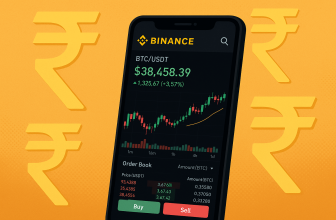Bitcoin and Cryptocurrencies are in high demand in India. Now Bitcoin and any cryptocurrency are legal hence you can invest in your favorite currency using any local crypto trading platform. Many Indian startups help you set up your account on their exchanges and let you deposit and buy cryptos for as low as Rs.100. Before you jump into buying in Bitcoin, Dogecoin, or any other crypto, you should understand its very volatile market and risky. Do not invest the money you can’t afford to lose.
What is Bitcoin?
Bitcoin is a digital currency. You can invest in the digital currency of your choice. There are many cryptos approx. 4500 as of mid-2021. Bitcoin is the costliest and very famous. Unlike Fiat currencies, govt. Don’t have control over the cryptos. It’s a decentralized system hence keeping tracking and taxing cryptos is tough.
Launched on 3 January 2009, bitcoin is the world’s first and largest cryptocurrency by market capitalization. Unlike fiat currency, bitcoin is created, distributed, traded, and stored with the use of a decentralized ledger system, known as a blockchain. Bitcoin is created by Satoshi Nakamoto and no one knows who that guy is.
If you had invested Rs.70 on 9 February 2011 you would have become an owner of 1 BTC which is worth Rs.45 lakh as of today.
Cryptocurrencies appear to have boomed in India in recent months, with Bitcoin, Ethereum, and Dogecoin all adding value. Indian crypto exchanges have experienced a crypto boom as the price of bitcoin has hit several record highs in recent months. Volumes on the exchanges have also soared, as more Indians are becoming interested in cryptocurrencies ranging from Bitcoin and Dogecoins to Ripple and Litecoin. While people like cryptocurrencies, India is seeing a surge in demand for Bitcoin and Ethereum and other cryptocurrencies such as Litecoin, Dogecoin, and Ripple.
This has also given Indian banks a glimmer of hope about the regulation of cryptocurrencies. The Reserve Bank of India is expected to formalize a regulatory framework for cryptocurrencies in the country. While cryptocurrencies have been unregulated in India, the RBI has not banned the trade in cryptocurrencies, and so cryptocurrency players are pushing for regulation of the cryptocurrency sector. For its part, the government has denied that it wants to ban blockchain and cryptocurrencies entirely in India.
With bitcoin transactions gradually gaining momentum in India, but the law governing them lacking, there is a possibility that the government will issue a communication in the coming months on Bitcoin taxation and disclosure requirements for bitcoin to allay fears about its legal status as an illegal currency. The first step is to review the basics for people new to space, to explain why Prime Minister Modi should buy bitcoin, rather than ban it, and how India can use crypto to regain its rightful place on the world stage.
We know that India will ultimately prefer crypto regulation, “said Gupta, who is also the co-founder and chief executive of Blockchain India, a blockchain technology exchange in the country. India should champion decentralized cryptocurrencies like Bitcoin and Ethereum to protect national security, prevent deformities, attract international capital, strengthen monetary policy, deter financial fraud, accelerate technological development, and accelerate its rise as a global power. While the future of cryptocurrencies still seems to reside in a fog of legislative uncertainty, there is no lack of interest in blockchain technologies and exchanges in this country and among cryptocurrency start-ups – companies are eager to make continual representations to the government to avoid a blanket ban.
It was in 2018 that the Supreme Court imposed a ban on the use of cryptocurrencies in India, but later ruled to legalize the trade. It was found that until 2018, buying and trading cryptocurrencies within India was illegal. As a result of the Supreme Court’s order, a majority of India’s cryptocurrencies – the foreign exchange exchanges have moved to the peer-2-peer model.
Shortly after the first cryptocurrency exchange opened its doors, the Reserve Bank of India (RBI) warned citizens about the risks involved in investing in cryptocurrencies. A day later, India’s central bank chief, Dr Raghuram Rajan, wrote to Indians warning of the dangers of investing in the cryptocurrency market and the risk of investing in cryptocurrencies.
In 2019, India’s Supreme Court called on the Indian government to create a regulatory framework for cryptocurrencies. India’s cryptocurrency industry has been pushing for such a regulatory framework for some time and welcomes the recent decision by the Securities and Exchange Board of India (SEBI) to require Indian companies to disclose past and future investments in cryptocurrencies and to issue a license to use cryptocurrencies in India. On March 4, 2020, a ban on Bitcoin and other cryptocurrencies imposed by the Reserve Bank of India was lifted because banks were not allowed to facilitate their use in the country’s financial system, prompting people to explore the possibility of reinvesting in Bitcoin.
India’s bitcoin industry welcomes this change, knowing that government acceptance of the cryptocurrency will provide the support it needs. The Indian government began discussing possible crypto-regulation as early as 2017, but only last January introduced a bill to parliament that would ban the use of any digital currency except one that could be issued by the RBI in the future. The cryptocurrency law aims to ban private cryptocurrencies and create an official digital currency in India, supported by both the government and the RBI while providing for certain exemptions to promote the underlying technology that drives the digital currency. The Centre is in discussions with the Central Bank about introducing appropriate legislation to regulate cryptocurrencies within India.
However, there is no evidence that the cryptocurrency law will make the use of currencies such as Bitcoin and Ethereum illegal in India. Recently, banks are blocking payment transfers to popular crypto exchanges like WazirX.





